Saturday April 15, 2017
By: May Allam
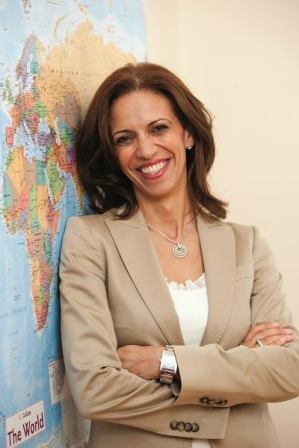 Shaden Khallaf is the senior policy advisor for the MENA Bureau of the United Nations High Commissioner for Refugees (UNHCR) in Amman, Jordan. She is the most senior Arab woman in policy-making related to the biggest displacement crisis in recent history.
Shaden Khallaf is the senior policy advisor for the MENA Bureau of the United Nations High Commissioner for Refugees (UNHCR) in Amman, Jordan. She is the most senior Arab woman in policy-making related to the biggest displacement crisis in recent history.
During her 18 years working with the UN, she traveled extensively throughout the region and her assignments spanned a wide range of responsibilities including refugee women and child protection, post-conflict transitions and reconstruction, designing advocacy and communications strategies and prevention of violent extremism.
An adjunct lecturer, Khallaf taught at the Department of Law and the Center for Migration and Refugee Studies at the School of Global Affairs and Public Policy of the American University in Cairo. She regularly holds seminars and public lectures at academic institutions around the world and has published numerous papers on refugee movements in MENA.
A strong advocate of gender equality and women’s empowerment, Kallaf is developing support mechanisms for women in the challenging humanitarian field.
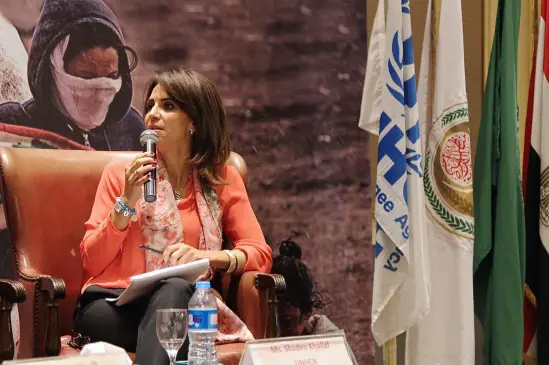
WOE: What are the issues that most concern you with the escalating number of refugees in the Middle East?
SK: Working on refugee issues with the United Nations and academia since 1998, and focusing on the Middle East and North Africa region, I have always made a point to highlight the particular challenges women face throughout the whole cycle of displacement. Arab women in general face numerous structural hurdles to their full empowerment, which become compounded by the unique sets of challenges they face when they are displaced.
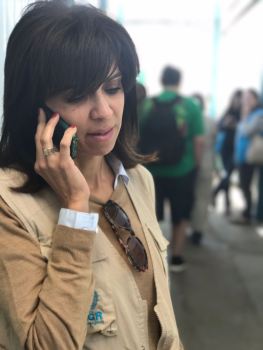 As an Arab woman, I feel an immediate connection of trust, and an expectation on their part that I would be their advocate and look out for their interest. I recall one refugee woman recounting how she and her young children were fleeing heavy aerial shelling of their homes in the middle of the night, and how her first instinct was to put her hands over her children’s heads as they ran. “I knew that this would in no way protect them from the bombs, but what can I say, I am a mother, and that’s what mothers do,” she said. It broke my heart. No mother should have to shield her kids from being bombed while they are asleep. But that’s the reality of millions of families in the region and elsewhere around the world.
As an Arab woman, I feel an immediate connection of trust, and an expectation on their part that I would be their advocate and look out for their interest. I recall one refugee woman recounting how she and her young children were fleeing heavy aerial shelling of their homes in the middle of the night, and how her first instinct was to put her hands over her children’s heads as they ran. “I knew that this would in no way protect them from the bombs, but what can I say, I am a mother, and that’s what mothers do,” she said. It broke my heart. No mother should have to shield her kids from being bombed while they are asleep. But that’s the reality of millions of families in the region and elsewhere around the world.
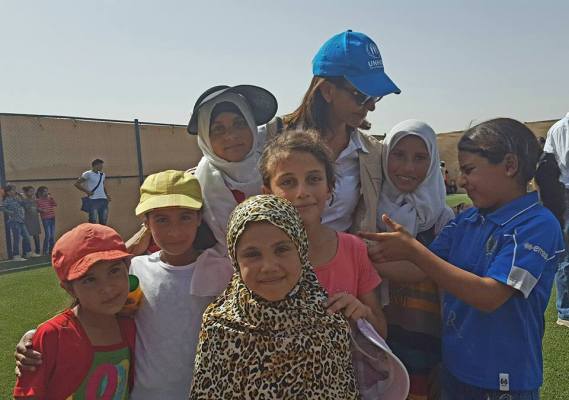
WOE: What are the major challenges facing your organization and how are you dealing with them?
SK: MENA is now host to the largest proportion of refugees in the world- close to 40% – despite Arab countries only making up 5% of the world’s population. This drastic proportion is a reminder that we are dealing with entrenched socio-economic and geopolitical factors which breed volatility, and which need to be tackled. We need to be able to prevent such large dramatic uprooting of people, who are forced to leave everything they know and love behind in search of safety. Despite the turbulence, however, the region has shown incredible resilience over the past few years, and we should therefore also examine what has been working and what has kept communities going, to build on and nurture the seeds of stabilization.
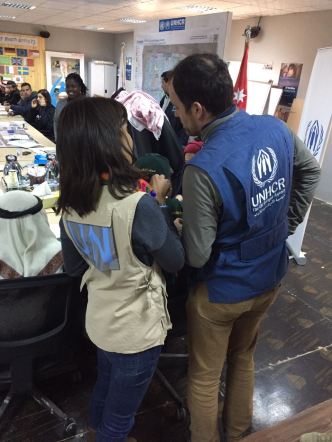 WOE: How did your education and extensive travels play a role in influencing your decision to join the UN?
WOE: How did your education and extensive travels play a role in influencing your decision to join the UN?
SK: Joining the United Nations was always the most natural next step for me after growing up in 7 countries and my exposure to the beauty of multiculturalism at a young age. My father’s work in diplomacy and foreign policy, and my mother’s work on women’s health, both immersed me in the world of public service, and the value of working on issues which transcended the individual. Looking back, there is nothing that could have better prepared me for the wealth of culture, understanding, and acceptance that comes with a transnational upbringing, and a sense of being part of the wider human family.
On campus at the American University in Cairo, I submerged myself in the Model United Nations program, which brought me even closer to understanding how the system worked and what each of us can do to make a difference. My years at AUC also helped me appreciate the value of giving back to the community and doing everything we could to best represent Egypt and contribute to its development and prosperity.
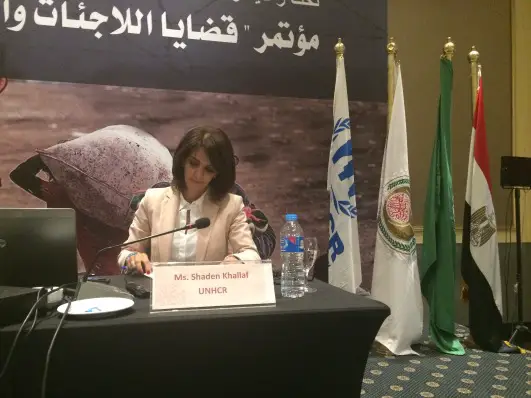
WOE: What notable contributions have you made to the refugee and humanitarian areas in the region?
SK: As an institution, it’s very important to have a sound understanding of the context we work in and to adapt our operations to the regional dynamics. Refugee protection in MENA has unique characteristics, and I have been exploring ways to capture and develop this in a concrete way. After planning, consultation, and a lot of hard work with an excellent team, we are now launching a cutting-edge initiative which amplifies the voice of civil society actors across MENA. It provides a platform for advocacy, research, and innovation among national NGOs, foundations, academia, media, and the private sector to allow local and regional actors to be heard and empowered.

WOE: How do you expect the initiative to make a difference?
SK: Our region has been dealing with refugee movements for centuries, and the long cultural and historic legacy of providing “aman” or safety to those fleeing danger is deeply enshrined in our collective psyche as Arabs. Yet we still do not have comprehensive enough regional structures to deal with such crises in predictable and sustainable ways, which also address the needs of host communities. Our network is therefore the first platform to offer responders from among local communities and stakeholders the opportunity to play a stronger role in influencing global policy making. The sky is the limit for the possibilities this will create down the line, and the benefits for all – refugees, host communities, governments, donors, and the international community as a whole – are vast.
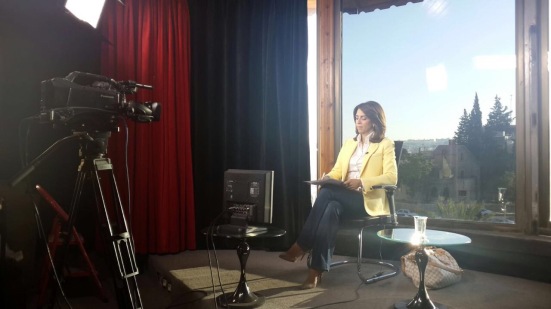
WOE: What challenges do you face on your job in general, and as a woman in particular?
SK:The humanitarian field is a tough one, and my fellow humanitarian workers are some of the bravest people I know. The places we work in, the exposure to the worst forms of human suffering and desperation, the obligation to speak out for those who cannot speak for themselves, working on the frontline of the world’s conflicts, under enormous stress, away from family and loved ones for extensive periods of time, all take a huge toll on UNHCR staff.
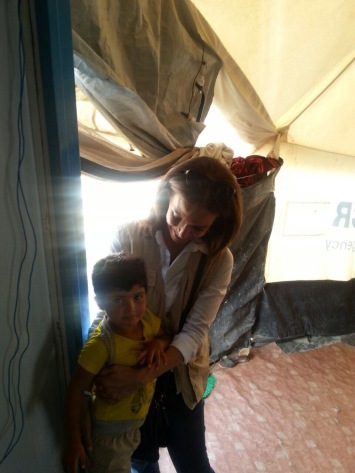 We’ve all been through difficult situations of emotional, physical, and mental pressure. We’ve lost friends to bomb attacks, had colleagues who have been kidnapped, spent time in inhospitable places, and we are deeply affected by what we see and do. I recall suicide attempts in my office out of desperation and fear; long visits to detention centers to interview asylum-seekers and refugees; flying in military aircrafts across conflict zones (and not telling my family about it until I got back); counseling survivors of rape, child labor, trafficking, slavery, and sadly much more –the worst forms of human abuse imaginable.
We’ve all been through difficult situations of emotional, physical, and mental pressure. We’ve lost friends to bomb attacks, had colleagues who have been kidnapped, spent time in inhospitable places, and we are deeply affected by what we see and do. I recall suicide attempts in my office out of desperation and fear; long visits to detention centers to interview asylum-seekers and refugees; flying in military aircrafts across conflict zones (and not telling my family about it until I got back); counseling survivors of rape, child labor, trafficking, slavery, and sadly much more –the worst forms of human abuse imaginable.
The first encounter I had with a young man who had been tortured because of his ethnicity is still etched in my mind. And yes, in some situations being a woman – and an Arab woman at that – was a complicating factor, and not always easily accepted. And there are situations I still have difficulty speaking about despite the passing of many years. Yet, there is always a way to stay grounded and to keep going. And when on the other side of all this is a case that is successfully resolved, with a father who is released; a mother who is resettled; a donation that is made; or a family that returns home safely, the fulfillment is indescribable.
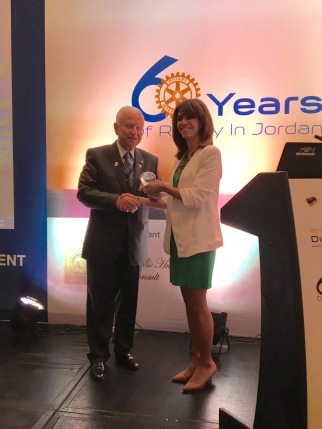 WOE: What are your aspirations for the future; on the professional and personal level, and your service to society?
WOE: What are your aspirations for the future; on the professional and personal level, and your service to society?
SK: I am absolutely committed to continuing to support women’s empowerment across the board, in the workforce, in legal systems, in academia, in development, in leadership, and at home. I genuinely believe that our region can only move forward and prosper when our systems and cultures are meaningfully based on the principles of equality, inclusion, and pluralism. I will always be committed to redress injustice and to uphold people’s basic rights to freedom from fear and freedom from want, as well as the freedom to enjoy the liberties we are all entitled to by virtue of being human.
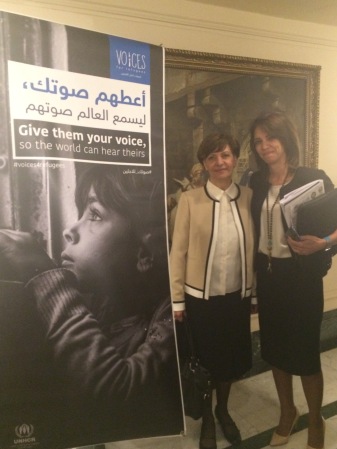 On the personal level, striking the balance between such a demanding line of work and the fulltime requirements of being first and foremost a mother is maybe the biggest challenge of all. It is a permanent juggling act of tasks, functions, schedules, and trying to squeeze as much as possible into 24 hours on a daily basis. Like many other working moms, I’ve had conference calls while helping with homework; pulled my laptop out at a playdate; placed birthday cake orders as I boarded a flight; and rushed out of media interviews to attend school performances. It’s all part of the package. But with understanding and supportive immediate family, and extended family in the form of friends and colleagues across the world, the pieces come together, and the personal and professional become two sides of the same coin, almost inextricable from on.
On the personal level, striking the balance between such a demanding line of work and the fulltime requirements of being first and foremost a mother is maybe the biggest challenge of all. It is a permanent juggling act of tasks, functions, schedules, and trying to squeeze as much as possible into 24 hours on a daily basis. Like many other working moms, I’ve had conference calls while helping with homework; pulled my laptop out at a playdate; placed birthday cake orders as I boarded a flight; and rushed out of media interviews to attend school performances. It’s all part of the package. But with understanding and supportive immediate family, and extended family in the form of friends and colleagues across the world, the pieces come together, and the personal and professional become two sides of the same coin, almost inextricable from on.

KwwtTrustWishesyouthebestofluckwith
yourministries GodBlessyouR
LikeLike